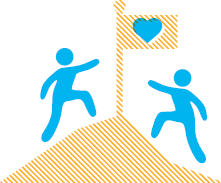
“As kids, Marc and I couldn't find the support that we needed to give back. So we set out to help others, to show them that it doesn't have to be a struggle to do good. That's our purpose at WE: to make doing good, doable.”
Part One: Chapter 2Breakfast and a Wake-Up Call
By Craig Kielburger
By any measure, my high-school experience was unusual—on those rare occasions I attended. One year, I logged fewer than 30 days in school. I repeatedly failed Grade 9 gym for not showing up. In my comparative religion course, I was docked marks for not properly footnoting a quote from the Dalai Lama. “But I can't cite a written source,” I had to protest. “That's what he told me!”
There has always been a negative correlation between WE's success and my life's sense of normalcy. As a teen, I could quote conversations I'd had with world leaders at global forums or development seminars, but I couldn't name a popular song or an Oscar-nominated movie. My classmates went on about a show called Dawson's Creek, which was “exactly like our lives!” I watched one episode: it wasn't. I was oblivious to conventional teen angst, being so busy with WE Charity (formerly Free The Children). Balancing a financial statement was more familiar to me than my math textbook. I fired my first employee before I ever broke up with a girl. Looking back, it was like living in a made-for-TV coming-of-age movie. A childhood ...
Get WEconomy now with the O’Reilly learning platform.
O’Reilly members experience books, live events, courses curated by job role, and more from O’Reilly and nearly 200 top publishers.

